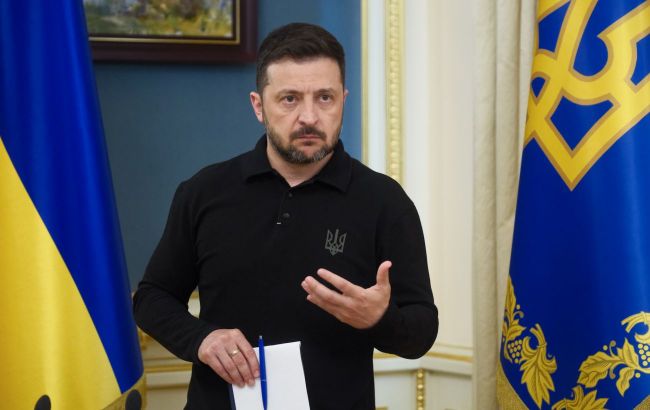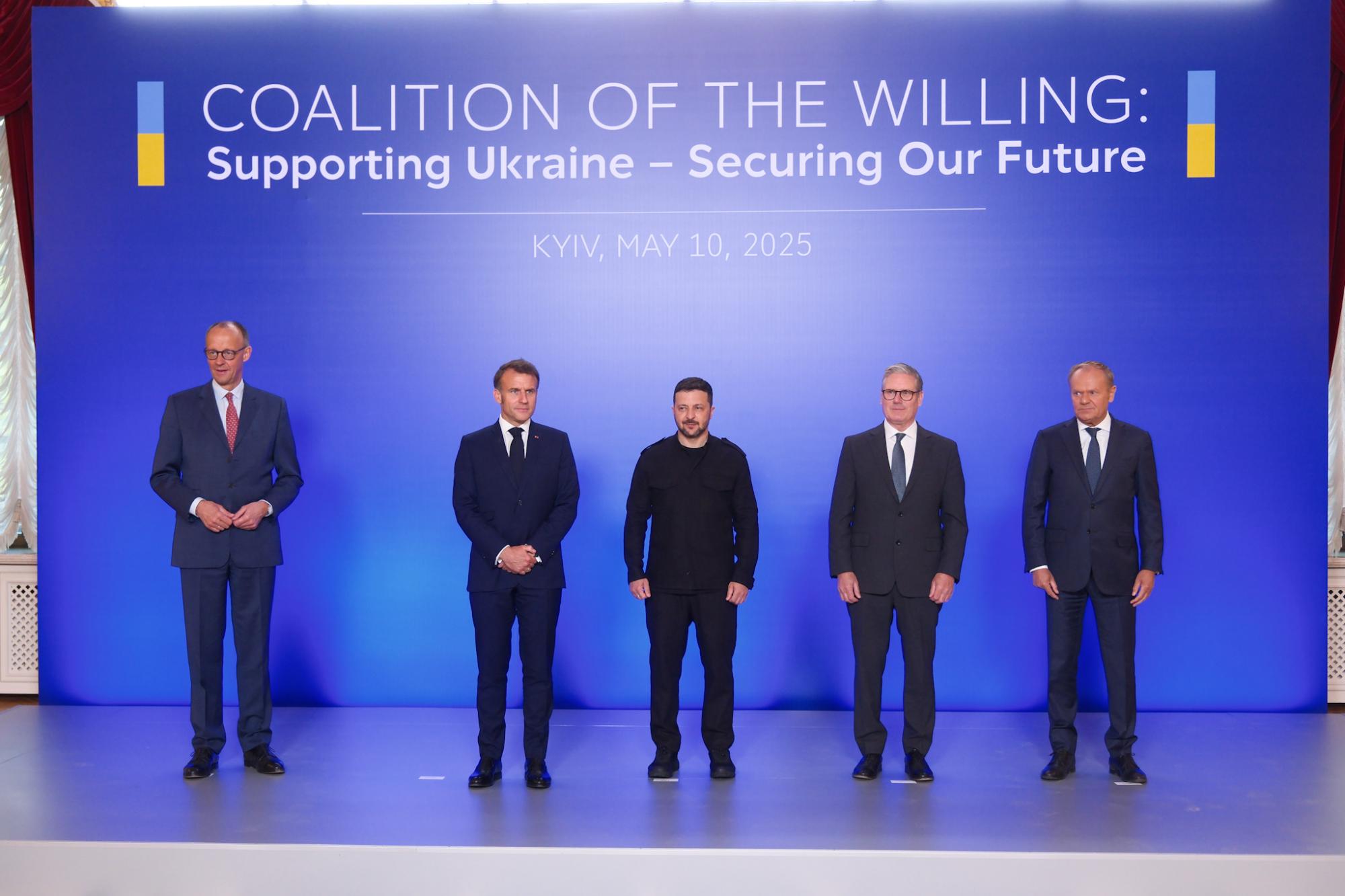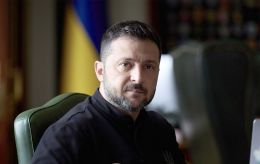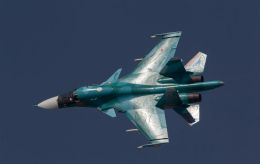Zelenskyy and Putin fighting for Trump. What to expect from Istanbul talks
 Volodymyr Zelenskyy (photo: Vitalii Nosach/RBC-Ukraine)
Volodymyr Zelenskyy (photo: Vitalii Nosach/RBC-Ukraine)
Why Türkiye became the next venue for talks on the Russian-Ukrainian war, what diplomatic maneuvers all the parties involved were conducting the day before, and what to expect from the talks in general, read in RBC-Ukraine's article.
Takeaways
- Why is Zelenskyy personally traveling to Istanbul?
- Why does Putin not want to go to the meeting?
- How can the Istanbul summit affect further negotiations?
- Should we expect new sanctions against Russia?
The sluggish negotiations on ending the Russia-Ukraine war have intensified quite dramatically. Against the backdrop of the anniversary of the victory over Nazism, leaders of many European countries in Kyiv issued an ultimatum to Putin to start a truce on May 12. Putin refused to take such a step, but put forward a counter-proposal for direct talks in Istanbul on May 15.
Reacting, Ukrainian President Volodymyr Zelenskyy said that he would personally come to Istanbul and wait for Putin there. As this initiative was also supported by US President Donald Trump, who even suggested that he would also come to Istanbul, Putin found himself in a very awkward situation. However, there was less and less certainty about Trump's arrival. Instead, the American media reported that members of his team would arrive in Istanbul on Friday, May 16, instead of Thursday, which further confused the situation.
At least as of the evening of May 14, most experts agreed that Zelenskyy had tactically outplayed Putin. They say that if Putin does not come in person, he will finally show Trump that he does not want peace.
However, there are other considerations. Putin is well aware of how obsessed the American president is with the desire to conclude a grand bargain on Ukraine, and can play on this. For example, so that Trump, who is not too keen on understanding the individual details of potential agreements between Ukraine and Russia and is unlikely to be deeply concerned about Ukraine's red lines, could put pressure on Zelenskyy to force Ukraine to make some concessions to Russia. And all for the sake of the very deal that would allow Trump to finally back up his boast of dealmaking skills with some concrete result.
In particular, this could be related to the intrigue over whether Putin would eventually go to Türkiye, which has been deliberately fueled in recent days by Putin himself and his entourage. Until it became clear that Putin would not be inTürkiye.
Why Istanbul was chosen as venue for talks
For Russia, the choice of Türkiye as a negotiating venue is due to several reasons. Of course, it is convenient, primarily from a logistical point of view.
In addition, Türkiye is in favor of balanced relations between Russia and Ukraine, despite the disappointment in this regard among Ankara's Western partners. Aslı Aydıntaşbaş, a fellow at the Center for the United States and Europe at the Brookings Institution and director of the Türkiye Project, told RBC-Ukraine.
"It [Türkiye - ed.] has long advocated negotiations to end the war and is not very sensitive about a territorial compromise, but it is very sensitive about Ukraine remaining a strong entity with a close relationship to the West and to Türkiye," Aydıntaşbaş said.
However, it is much more important for Putin that it was in Istanbul that the first large-scale talks between Moscow and Kyiv took place after the start of Russia's full-scale invasion of Ukraine in late March 2022. Although they ended in nothing at the time-Ukraine withstood and intended to continue resisting aggression-Russia presents the current round of talks as a continuation of that very process
"For Putin, such a symbolic link to Istanbul is important. And this should mean that the negotiations should be on Russia's terms. Negotiations are not about a ceasefire, but about Ukraine's fulfillment of Russia's unilateral demands that we make peace through our unilateral concessions," political analyst Volodymyr Fesenko told RBC-Ukraine.
This is the main factor that determines Putin's policy in this situation.
Even the fact that the Russian delegation is now headed by Putin's aide, Vladimir Medinsky, as it was more than three years ago, shows that Moscow views the current negotiations as the second series of meetings in 2022. And it is ready to discuss absurd topics like denazification instead of substantive decisions on a ceasefire right now.
Negotiations for sake of negotiations
Regardless of Putin's presence in Istanbul, the development of events will be approximately the same, Volodymyr Fesenko told the agency. According to him, the main issue of the talks is whether the United States will be able to push Putin to a ceasefire agreement.
"Whether Putin comes or not, I don't expect any miracle in the form of a ceasefire agreement. But if there are no preliminary agreements between the delegations on a ceasefire, if the Americans do not push the Russians to do so, then everything will end in an exchange of statements and mutual accusations. And there will be no result," Fesenko said.
There are not only rational reasons for Putin not to come to Türkiye, but also purely psychological ones, according to Russian opposition political analyst Ivan Preobrazhensky.
"He (Putin - ed.) is afraid to meet with Zelenskyy. He does not need it at all, he is against his background... It's like a confrontation between the killer and the victim," the expert said in an interview with RBC-Ukraine.
In his opinion, Putin is also afraid that he will be cornered during the meeting, just as Trump did with Zelenskyy during the infamous Oval Office skirmish. And even if Trump comes to Istanbul, Putin will have to clearly articulate his position and explain why he is delaying the ceasefire.
 Coalition of the Willing in Kyiv. From left to right: Friedrich Merz, Emmanuel Macron, Volodymyr Zelenskyy, Kier Starmer, Donald Tusk (photo: Vitalii Nosach/RBC-Ukraine)
Coalition of the Willing in Kyiv. From left to right: Friedrich Merz, Emmanuel Macron, Volodymyr Zelenskyy, Kier Starmer, Donald Tusk (photo: Vitalii Nosach/RBC-Ukraine)
In addition, according to RBC-Ukraine, there is a widespread opinion in the government offices of Ukraine and Europe that it is not profitable for Putin to agree to a ceasefire at least until the fall, while the weather allows for an offensive on the front and the Russian economy still has some margin of safety. The strategy of the Russian delegation in Istanbul, no matter who is part of it, will follow from this attitude.
"They (the Russians - ed.) have to create the impression that they are ready for negotiations, for the end of the war. But it will be a purely propaganda delegation that is not authorized to make any decisions," Mykhailo Podolyak, advisor to the head of the Office of the President of Ukraine, told RBC-Ukraine.
According to him, by pretending to be ready for negotiations, the Kremlin simply wants to stall and postpone tougher sanctions against Russia, as well as large-scale arms supplies to Ukraine. Both of these options have been put forward at the level of ideas at different times by members of the Trump team, but they have not yet been implemented.
Will there be sanctions against Russia
European leaders in Kyiv have made it clear that if Putin does not agree to a ceasefire, he will face a new package of tough sanctions against Russia. Although they set a May 12 deadline for the Russian leader, the final decision was put on hold until the meeting in Istanbul. But while in the case of Europe, Ukraine can count on the activity of France, the United Kingdom, and Poland, the position of the United States remains important.
First and foremost, the United States mustn't block European sanctions through Hungary. And even more importantly, because it is the United States that can hurt Putin with its sanctions. So much so that Putin would agree to take real steps toward peace.
And the latest, 17th package of European sanctions illustrates this perfectly. Certainly, the very fact of its adoption, the expansion of restrictions against the Russian tanker fleet, and the inclusion of new individuals and legal entities in the sanctions lists a positive things. But it is frankly not enough to force the Kremlin to take real steps toward peace.
Even RBC-Ukraine's European interlocutors admit that the sanctions story, which has been discussed so much in recent days, has a chance of success only if Trump acts in concert with the European Union. And the EU itself should not make such simple mistakes as on Monday, when German government spokesperson Stefan Kornelius gave Moscow until the end of the day to agree to a ceasefire. But when Putin blatantly ignored this ultimatum, nothing happened. RBC-Ukraine's European interlocutors agree that in global politics, there is nothing worse than an unfulfilled threat or ultimatum.
On Saturday, immediately after the leaders of the Coalition of the Willing called the American president, it seemed that Trump finally sided with the Europeans in putting pressure on Russia. However, as soon as Putin offered the bait in the form of the Istanbul talks, Trump immediately swallowed it, demanding that some kind of deal be struck immediately.
So far, the US president has limited himself to talking about the possible imposition of crippling sanctions, without taking any real action. As RBC-Ukraine has reported, Trump's entourage is divided on this issue. In particular, Secretary of State Marco Rubio and special envoy for Ukraine Keith Kellogg are in favor of increasing pressure on Russia, while special envoy for Russia Steve Witkoff is against this approach. This balance may be changed by the meeting in Istanbul.
"That is why Zelenskyy summoned Putin to Istanbul, so that his failure to come to Istanbul, or his refusal to agree to a ceasefire, could be used as an argument for the Americans to impose sanctions," Fesenko told the agency.
Although Trump's rhetoric in recent weeks suggests that he is gradually realizing Putin's unwillingness to make peace, it may take some time for these messages to sink in.
As of now, it remains completely unclear in what format the Ukraine-US-Russia talks will take place in Türkiye, or if they will take place at all, but in any case, Zelenskyy's visit to Türkiye will not be in vain. He has a separate meeting in Ankara with President Recep Tayyip Erdoğan. There are many issues on the agenda: from defense cooperation to trade, and ultimately, the sending of Turkish troops to Ukraine as part of the European Support Force.
Volodymyr Zelenskyy himself said that the Ukrainian side would decide on its actions after Russia finally announces the composition of its delegation. As of the time of the publication of this article, there were no official reports on this, and RBC-Ukraine's sources in the Ukrainian government also did not provide relevant information on whether Ukraine was ready to talk to Medynsky and his companions in some format.
In any case, with its maneuvers around the Istanbul talks, Russia has once again shown that it is not ready for serious talks about ending the war. Now, the key task for both Ukrainians and our European allies is to ensure that Donald Trump interprets the situation in the same way.

